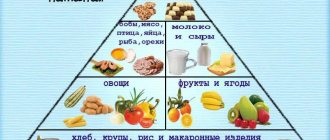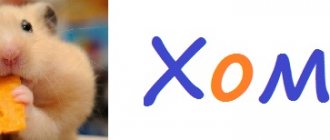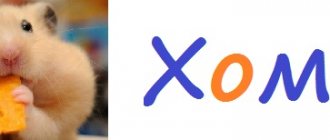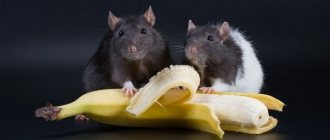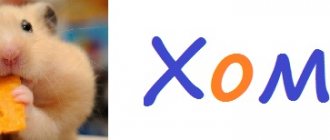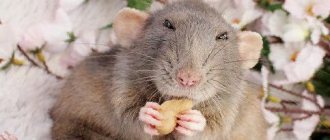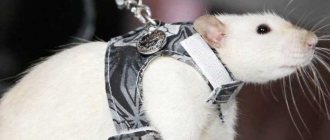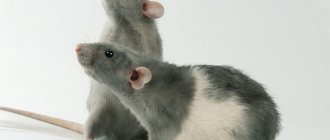Fruit seeds and seeds
One of the prohibited foods is fruit seeds. In particular, the seeds and kernels of citrus fruits contain the toxic substance amygdalin. When it breaks down, hydrocyanic acid is released. One bone contains enough poison to kill the animal. Do not feed your rat seeds and pits of plums, apples, peach, oranges, cherries, lemons and other fruits. Rapeseed and mustard seeds are prohibited for consumption. It is allowed to feed your pets watermelon, sunflower and pumpkin seeds. They are used as a supplement to main food. An overdose of seeds can cause serious poisoning.
What can you feed rats sometimes? Feeding the rats
- Oats, rolled oats - sometimes as a treat or as an additive to the main food.
- Corn is high in starch and high in calories.
- Wheat is high in calories.
- Semolina does not cause harm, but it is also beneficial, it is better to choose other cereals.
- Bananas are high in calories.
- Pears – possible gas formation.
- Pomegranates should not be given on an empty stomach or in large quantities.
- Kiwi – contains acid, should not be given on an empty stomach or in large quantities.
- Pomelo, plum - can cause intestinal upset.
- Chokeberry - has astringent properties and can lead to constipation, lowers blood pressure.
- Dried fruits – possible gas formation.
- Bird cherry has a fastening property and can lead to constipation.
- Citrus fruits contain a lot of acid; rats can eat tangerines and oranges in small quantities.
- Artichoke, eggplant, potatoes are not allowed raw.
- Onions and green onions are not allowed in large quantities.
- Broccoli and sweet peppers can be eaten in any form, but not in large quantities as they lead to gas formation.
- Tomatoes are not allowed on an empty stomach.
- Garlic – not allowed in large quantities.
- Acorn - can be dried in small quantities.
- Peanuts, walnuts, sunflower seeds, coconut, pine nuts - in small quantities.
Feeding the rats
Vegetables
Certain types of vegetables should not be included in your pet rat's diet:
- Vegetables from the Brassica family: turnips, radishes and radishes. They lead to increased gas formation in the intestines;
- any type of cabbage causes bloating in a rat;
- Potatoes contain a huge amount of starch, which is harmful to the rodent’s stomach due to difficulty in digestion. Tops and sprouts are harmful due to solanine;
- legumes (peas, beans, lentils and others) disrupt the functioning of the gastrointestinal tract. If the animal does not have digestive problems, it is allowed to give dried mung beans, chickpeas or peas.
- You should not feed your pet raw artichoke. Reduces pressure due to increased alkali levels;
- beets are allowed to be given only in small quantities. It has a laxative effect;
- Raw eggplants contain the toxic organic compound solanine. You can give the vegetable, previously peeled and boiled;
- It is undesirable to eat cucumbers. They cause stomach upset and diarrhea;
- animals should not eat tomatoes due to the oxalic acid content;
- garlic and onions irritate the gastric mucosa, because... contain biologically active substances phytoncides.
Protein in a rat's diet
A rat is not a rabbit or a guinea pig, it cannot thrive on a vegetarian diet, it is important for it to get protein. Adults are given protein food twice a week, and young animals twice as often. But moderation is important in this matter - an adult animal needs only 20 g at one time.
The rat can be given lean boiled meat, boiled eggs, fish, shrimp or squid. If you have several rats living at home, then you need to give them protein supplements individually, since they really love such food and can fight for it. As a result, someone will be oversaturated, and someone will not receive their norm.
If you give a rat an egg, boil it soft-boiled so that the rat does not choke on the boiled yolk. A quail egg can be given with the shell, the rat will peel it itself or eat it straight away.
The animal loves fish or seafood, but after eating it, its urine acquires an unpleasant odor.
Green food
A caring owner needs to monitor the consumption of greens by a pet rat. List of prohibited green food:
- bugs and horseradish contain substances harmful to animals - essential mustard oils;
- sorrel spinach are a source of oxalic acid, which is dangerous for the pet’s body;
- You can’t feed rhubarb to animals, because it causes disruption of the gastrointestinal tract;
- seaweed has a high iodine content.
Grain and cereals
Grains are the main product in the diet of rats, but they are not equally important. Wheat is a rich, high-calorie product; it can be given to rats, but it must be taken into account that it must be supplemented with other components. The mixture may include oats, buckwheat, corn, rye, barley or pearl barley, rice, millet or millet. These grains are not equal. Buckwheat is a dietary low-calorie product, and corn, on the contrary. Oats should be added in small quantities; excess may cause fermentation. Refined rice is low in nutrition, so it's worth finding a wild rice blend or an unrefined version of the grain.
Semolina does not contain anything useful, so this product should be excluded from the diet. Barley or wheat cereals are suitable for porridges. Porridge is useful only for weakened, emaciated animals or young animals. Adult rats should only give them as a treat.
Fruits and berries
Citrus fruits are prohibited for consumption; they can cause an allergic reaction that can be fatal. The reason for this is increased acidity. In some cases, you can give a piece of ripe tangerine as a treat. It is not recommended to add grapes and pears to your pet's menu. They lead to digestive problems: increased gas formation or severe stomach upset. Apples and persimmons are a source of poisonous hydrocyanic acid and amygdalin glycoside.
Dried fruits are prohibited, because they cause fermentation in the intestines. Figs, cranberries, rowan berries, green bananas and pineapple should not be given. The rat should not eat plums due to the laxative effect. Chokeberry and bird chokeberry lead to constipation. Garden or forest berries are not produced depending on the acidity level. Melon and watermelon must be fed during the season, because... at this time the amount of nitrates decreases. Fruits and berries are not the main food of rodents. Their consumption on an empty stomach leads to digestive system disorders.
What fruits can you give to a rat?
Rats prefer sweet fruits. In addition, the high acid content in fruits can lead to digestive disorders. Experienced breeders recommend offering furry cats the following types of fruits:
- apple (seedless);
- pear;
- peach;
- banana;
- avocado (pulp only);
- apricot;
- melon;
- watermelon;
- mango;
- plums;
- pineapple – a little, due to the large amount of sugar;
- persimmon;
- figs (small portions);
- kiwi;
- cherry, sweet cherry.
It should be borne in mind that some fruits (pear, plum, apricot) can cause fermentation, flatulence, and diarrhea. Therefore, in order to avoid problems with the gastrointestinal tract, it is necessary to give these treats in doses. If no negative reactions are noted, you can slightly increase the portion.
Watermelon and melon pulp should be given with caution, since nitrates are often used when growing melons. These products must be purchased from trusted retail outlets.
Dried fruits are allowed as a treat (1-2 times a week). Rats will like raisins, dates, dried apricots, and prunes. Offering these treats should be done with caution as they can cause bloating and diarrhea.
When feeding a rat with fruit, you need to make sure that no seeds, for example, from cherries or apricots, get into the feeder. Because they are a real poison for rodents.
Milk products
When adding dairy products to a rat's diet, it is necessary to take into account a possible allergic reaction to lactose. It is not recommended to give milk in its pure form. New dairy products should be introduced gradually, and the pet's reaction should be monitored. Cheese, sour cream and cream are undesirable for animals to eat due to their high fat content. Fermented milk products with a fat content of more than 4% are prohibited. Rats cannot have condensed milk, because... it contains a large amount of sugar. It is not recommended to give dairy products with a long shelf life.
What can you feed decorative rats, but with caution (problems are possible)
- Semolina (no harm, but no benefit either, it’s better to choose another cereal).
- Artichoke (not allowed raw).
- Eggplant (cannot be eaten raw, as it contains solanine).
- Broccoli (in any form, but in small quantities - can cause increased gas formation in animals prone to this).
- Potatoes (not raw, boiled - only occasionally).
- Citrus fruits (contain a large amount of acid; ripe tangerines and oranges can be given in small quantities).
- Milk (if the animal is lactose intolerant, indigestion may develop).
- Chocolate (you can use just a little bitter (dark) chocolate containing more than 80% cocoa).
- Bakery products (not sweet, dried and very little).
- Cookies (not sweet, in small quantities).
- Herbal tinctures (water tinctures are given as directed, alcohol tinctures are not given).
How to prepare food yourself?
We are preparing a diet for a domestic rodent. It’s worth starting with preparing grain feed. It should include the following crops:
You can add rice to your diet, but in small quantities. The animal can be given seeds, no more than fifteen grains per week, and fed with dandelion seeds. The seeds should be raw and without salt.
From fruits and vegetables you need to enter: apple, banana, dates, cabbage (boiled), carrots, blueberries and raspberries. It is better to exclude pear from the rodent's diet.
“Yummy” for your beloved pet. What products make up the treats? The animal can be given cookies, boiled pasta, nuts and crackers. You should pamper once a day.
You need to include grass and greens in your diet:
The grass should be given in small quantities in small bunches. The pet will make reserves from the remnants of greenery, which will subsequently negatively affect its stomach.
Boiled eggs on rats' menu: benefit or harm?
Domestic rats enjoy eating boiled eggs. Therefore, some owners treat their little pets to this delicacy almost every day, believing that it is good for their body and gives their fur shine and a well-groomed appearance.
This product is truly a healthy and nutritious treat for cute animals, but if used incorrectly, it can be harmful to the health of the animal.
You can avoid this by adhering to several rules:
- Rodents may be allergic to this product. Therefore, when offering eggs to rats for the first time, it is necessary to observe whether the animal has an allergic reaction (itching, redness of the skin);
- adult pets are fed a boiled egg no more than once a week;
- small rats can be given such a treat once every three to four days;
- Rats prefer boiled egg yolks to whites. But the animal may choke on the yolk and before feeding it is advisable to dilute it with a small amount of water or milk;
- It is not recommended to give fried eggs to pets, as they are prepared with the addition of sunflower or vegetable oil, which is harmful to the liver of rodents;
- We should also not forget that these foods are quite high in calories and their excessive consumption can lead to the development of obesity in the animal.
Important: rodents should not be fed salty, hot or spiced foods, so you should not give them eggs from your table, for example, stuffed or covered in sauce.
How to quickly get rid of mice: 5 ways
Victor® has developed a number of quick fix solutions that require minimal effort on your part.
- Victor® Scent-Away™ Repellents. Rodent repellents are drops containing peppermint oil, the strong smell of which rodents cannot stand.
- Victor® Tin Cat® Humane Traps. Allows you to catch several mice at once. After this, you can release them in an open area.
- Hygiene traps. Don't want to touch the mouse? Use Kill & Seal™ Hygienic Mouse Trap and you can easily dispose of your rodent without touching it.
- Electronic traps. Quickly kill a mouse, destroy up to three mice in one installation.
- Rodenticides. If you're dealing with outdoor pests, the Victor® Fast-Kill Refillable Bait Station will help you eliminate your rodent population in no time.
The common myth that rats love cheese and cannot live without it is fundamentally untrue. And many people answer the question: “What to feed domestic rats?” There is a ready answer: of course, cheese. This stereotype probably originates from the practice of luring wild rats into mousetraps using odorous and fatty cheese. However, this delicacy, which most rodents really won’t refuse, is very harmful for domestic rats, as it contains a large amount of fat (45-55%), salt and sugar. A rat will not live long on this diet. Obesity, indigestion and high blood pressure are not the worst things that can happen if you feed your rat incorrectly.
What to feed pet rats
Veterinarians unanimously declare that a rat should always have a bowl of food in its cage. It is better if the owner fills it once a day at the rate of a tablespoon of food plus greens and vegetables once every 24 hours.
It is important to note that rat pups up to six months cannot be limited in food and their bowl of food can remain full around the clock. Experienced rodent lovers feed rats as follows: Grain mixture, some animal protein, vegetables and fruits every day, as well as small amounts of dairy products and treats.
Thus, every day you can give your rodent a tablespoon of rat food mixture. Or it could be other cereals that are beneficial for pets. The best options are buckwheat, pearl barley, millet, rice, rye and not too much wheat cereal due to its high calorie content. You can cook porridge from cereals without salt and oil.
You can give boiled or steamed chicken, lean beef, veal, turkey, fish (boneless fillets), as well as low-fat sugar-free yogurt and a little kefir or milk (in very small quantities) three times a week. Fried and fatty meats should not be given. From seafood, boiled mussels, shrimp, and squid are allowed in very small quantities.
List of prohibited products
Prohibited products include the following:
- Alcoholic drinks contain harmful substances that are addictive;
- carbonated drinks cause increased gas formation in the rat’s stomach;
- store-bought crackers and chips are prohibited because they contain a lot of salt and spices, as well as preservatives;
- mushrooms can cause serious poisoning, because difficult to digest;
- Dry and smoked fish are prohibited. They contain a high content of carcinogens and salt;
- rats cannot eat sweets due to the large amount of sugar;
- Caffeine in coffee leads to dehydration and increases blood pressure. Drinking tea is also not advisable;
- flour products contain a large amount of sugar, salt and butter;
- certain types of plants are hazardous to health;
- many house flowers contain toxic substances;
- Pickled, fried, spicy and smoked foods should not be added to the diet. They cause the development of serious diseases, which can subsequently lead to the death of the animal;
- Store-bought corn sticks should not be given as a sweet treat;
- You should not feed your pet rat honey because of the high sugar content;
- freshly squeezed or canned juices have a high concentration of acids;
- branches of trees and shrubs are a source of glycosides and tannins that are dangerous to the rodent’s body. Linden leaves and bark cause a strong choleretic effect;
- the large amount of oil in peanuts can cause stomach upset, leading to increased gas formation;
- Feijoa is highly acidic and contains iodine, so it is prohibited.
The lifespan of a domestic rat depends on the quality of its diet. A caring owner must carefully plan the rodent's menu to avoid health problems. If the owner wants to provide the animal with a long and happy life, he should pay attention to what foods should not be given to rodents.
Of all rodent species, rats and mice are the most unpretentious in terms of habitat and diet. This is largely due to the fact that they had to adapt to different conditions, and this is especially true for those animals that live in cities. Mice and rats will eat almost anything that humans eat and will willingly coexist with us in almost any circumstance.
If a mouse has settled in your house, you will be curious to find the answer to the question of what it prefers to feast on. Homeowners are also often interested in what attracts rodents to their garden and local area. The answers are all around us, just look at the overflowing trash can on the street or the cesspool. Whether we are ready to admit it or not, people continue to provide shelter and food for these animals without even knowing it.
What does a rat eat?
In the wild, rats are practically omnivores: they eat leaves and stems of plants, seeds and grains, insects, small animals and even birds, food waste (meat, vegetables, sausage casings, stale bread). In the absence of food, rats have to eat rubber, furniture, paper, wires and other not the most appetizing materials. Therefore, the question “what does a rat eat” has a simple answer: almost everything.
What about cockroaches?
Wild rats and some ornamental species happily eat cockroaches. Individuals living in city streets, basements, and garbage dumps, under conditions of a limited “menu,” eat these insects as well.
It’s more difficult with decorative rats. The problem is that special types of cockroaches are bred for food, which reproduce at a tremendous speed. Therefore, you need to think several times: is it worth breeding a whole terrarium of not the most pleasant insects in order to occasionally feed a couple of individuals to your pet?
In addition, cockroaches do not contain substances that are particularly valuable for nutrition.
Cockroaches
Products that help protect the health of your pet rodent
There is a list of products that should be included in the menu. They will help protect against diseases, increase immunity, and avoid cancer.
Products that resist viral diseases:
- plum;
- strawberries;
- cranberry;
- prunes.
When your pet feels unwell, a number of products can be used as antibiotics:
But breeders do not recommend self-medication and contact a veterinarian at the first signs of illness. Self-medication will harm your beloved rodent.
When to feed a rodent: nutritional proportions
When and how to feed your pet rodent. If you listen to the advice of breeders and veterinarians, you should feed your decorative rat twice a day, morning and evening. This routine is necessary in order to avoid problems with the digestive system.
The exception is pregnant females. They need to be fed 3-4 times a day.
Important. When composing a menu for a decorative rat, it is important to maintain the correct proportion, namely:
The daily norm is 45-50 grams of feed.
Vitamins and supplements
For growth and development, rodents need vitamins and microelements. If the animal’s nutrition is complete, then the pets do not need additional sources of nutrients. Rat food manufacturers try to include all kinds of vitamins and additives in their products. Lack and insufficient intake of nutrients causes vitamin deficiency, rickets, osteoporosis, muscle weakness and other health problems.
To prevent diseases, the animal’s diet includes supplements containing microelements necessary for development:
- Sodium is found in rock salt and fishmeal.
- Phosphorus - in liver, sea fish and milk.
- Calcium is found in bone meal, chalk and slaked lime.
- Potassium is in table salt.
- Magnesium is present in salts and green feeds.
- Sulfur is found in dairy products.
- Iron is found in greens, wheat bran and yeast.
The rodent body needs minerals in small quantities, otherwise they are not absorbed. For the correct balance of microelements, additives based on yeast, soy flour and animal feed have been specially developed.
Vitamins play a significant role in the development and formation of a pet’s bone tissue:
- A: responsible for growth and reproduction, found in milk, egg yolks, fish oil and carrots.
- D: for bone tissue and is present in fish oil and irradiated yeast.
- E: normalizes cell growth, is responsible for offspring. The presence is noted in the germs of sprouted wheat seeds, in corn and peas, in vegetable oils and lettuce leaves, in eggs and milk.
- B: responsible for liver function. Present in brewer's yeast and fish meal.
- B1: takes care of the nervous system. They are rich in bran, yeast, oats, and dairy products.
- B2: activates metabolic processes; found in yeast and sprouted grains.
- B3 (pantothenic acid): responsible for metabolism. Found in peas and beans, yeast and liver, egg yolk and fish roe.
- B12: promotes the growth of young animals. Source: fishmeal and shellfish meat.
- C: strengthens the immune system, is responsible for growth. The content was noted in fresh vegetables, fruits, and herbs.
- K: responsible for blood clotting. Present in hay and root crops.
For vitamin deficiency, veterinarians recommend synthetic vitamins and supplements, but this requires a precise approach to the dose of drugs. An incorrectly calculated dose of medicine leads to the death of the animal.
To prevent vitamin deficiency, supplement your pet’s menu with ready-made balanced food.
Can rats eat oranges?
Feeding advice from leading UK experts - Alison Campbell, Jemma Fettes
Not all fruit and vegetables are created equal for rats. For example, large quantities of vegetables containing starch or sugar can cause some problems. Recommended ratio of vegetables and fruits in the diet of rats: . 50% leafy vegetables* (10-15% of which may be herbs) 20% colored vegetables*. 10% legumes*. 10% other* . 10% fruits/berries*
All of the listed vegetables, fruits, berries and legumes are suitable for feeding rats (detailed description below)
• Apricot - high in vitamin C, beta-carotene and antioxidants. Give pitted (contain cyanide and D-Limonene), dried ones are not recommended because they are treated with sulfur dioxide • Watermelon • Avocado (only the pulp, peel and pit are toxic) • Orange - like all citrus fruits contains D-limonene, which is dangerous for males, give allowed only for females • Pineapple – contains a large amount of sugar, give in moderation
• Bananas • Bamboo shoots/sprouts • Eggplant • Basil – leaves or whole plant can be given • Broccoli (can be given raw) • Brussels sprouts (can be given raw) • Bok choy/pak choy/ bok choy – good alternative to cabbage kale (kale) and dandelions • Rutabaga • Elderberry
• Pomegranate – contains high amounts of vitamin C and antioxidants, which most rats enjoy eating • Mushrooms – can be given raw, dried or cooked • Green peas • Pear
• Figs (in small quantities)
• Savoy cabbage • Cauliflower • Potatoes • Sweet potatoes (yams) - cooked • Zucchini • Kale (kale) cabbage - excellent source of calcium and phosphorus for bone health • Cranberries • Clover, leaves • Clementine (girls only) • Kumquat — contains D-limonene (for girls only) • Kiwi (without peel) — is an excellent source of moisture, convenient and useful to give during trips and exhibitions. Give in small quantities. • Watercress • Coconut • Corn – can be given either cooked or fresh. Contains a lot of sugar, not recommended to be given frequently • Strawberries • Gooseberries
• Lettuce (in small quantities) • Lime (girls only) • Lemon - contains D-limonene (girls only) • Loganberry • Leeks
• Tangerines – contain D-limonene (girls only) • Mangoes – contain D-limonene (girls only) • Raspberries • Chard (high oxalic acid content, give in small quantities) • Passion fruit • Mung beans (sprouted, raw, canned or boiled) • Carrots – contains a large amount of vitamin C. Can be given raw or cooked.
• Nectarines • Chickpeas (baked, sprouted, canned or boiled)
• Dandelion leaves (an excellent source of calcium and phosphorus for bone health) • Cucumber - an excellent source of moisture. Convenient to give during trips and exhibitions • Olives • Okra (other names: okra, lady fingers, abelmosh)
• Parsnips • Papaya • Pomelo – high in sugar and D-limonene – not allowed for males, small amounts for females • Peaches (pitted) • Sweet peppers – can be given with seeds, fresh or cooked
Source
Should you give your pets raw eggs?
Wild rats often raid chicken coops in the hope of profiting not only from bird food, but also from their favorite delicacy - chicken eggs. For the same purpose, animals often steal the nests of sparrows or pigeons. Indeed, for tailed animals forced to survive in harsh conditions, this product is a valuable source of protein and vitamins.
But, unlike their wild relatives, ornamental rodents do not need additional protein, as they receive all the necessary microelements and vitamins from food, which is made taking into account the needs of these animals. Therefore, feeding small pets raw chicken eggs is undesirable, and sometimes even harmful. The fact is that they sometimes contain larvae of parasites, for example, worms, and animals after such a treat can become infected with them, which will lead to long-term treatment.
As an exception, you can pamper your pet with a raw quail egg. This treat should be given to your rat no more than once every two weeks. The portion should not exceed half a teaspoon.
If your pet likes to eat a boiled or raw egg, you should not deny him this pleasure, because if consumed in moderation, this product will become a tasty and healthy addition to his diet.
Is it possible to give eggs to pet rats 5 (100%) 2 votes
What should you not feed your pet rat?
Any products containing salt, sugar, spices, dyes, flavors and preservatives are contraindicated for rats. Therefore, most “human” food is not suitable for them. Chips, sausage, sweets, alcohol, smoked or pickled foods are prohibited.
If mommy eats a cupcake, that's right - we eat a cupcake too!
Foods prohibited due to high fat content (rats have weak livers):
- Sour cream, cream, condensed milk;
- Cheese (yes, cheese is strictly prohibited);
- Lard, bacon;
- Oil.
You should not give vegetables that contain a dangerous toxin - solanine, that is, from the nightshade family:
- Tomatoes;
- Eggplant;
- Bell pepper;
- Potato.
Boiled potatoes can be given, but only occasionally due to their high starch content. There is no point in such a “delicacy”.
You should not give fruits and vegetables that cause gas in the intestines. Such products can be really dangerous for rodents:
- Beans, beans, peas;
- Radish;
- Cabbage;
- Radish;
- Broccoli;
- Turnip;
- Radish (daikon);
- Pears;
- Dried fruits.
Causes intestinal upset (diarrhea):
- Beet;
- Plums.
Fruits that contain large amounts of acids are also contraindicated for rats:
- Any citrus fruits (tangerines, oranges, grapefruits, pomelo);
- Kiwi;
- A pineapple.
Be careful when feeding melons and watermelons to rats due to their high sugar content and the possibility of nitrate poisoning.
You should not give pits containing hydrocyanic acid (apricots, plums, cherries); for the same reason, rats are not given almonds.
Be careful during lunch: if rats are nearby, the game “Give me a piece, man!!!” begins.
Healthy foods for rats
In order for your pet to feel good and develop normally, it is necessary to feed it high-quality food from the first days of life. The benefits of a properly selected diet can hardly be overestimated. By receiving natural, balanced nutrition, your pet will grow healthy and active, and its coat will be shiny and pleasant to the touch.
Cereals and grains
Cereals and grains are an integral part of the rat menu. Cereals are rich in carbohydrates, which provide sufficient energy, and proteins, which are the main building material for all cells of the body. The following foods are considered the most beneficial for rats:
- Wheat forms the basis of the diet of rats. It consists of 70-75% carbohydrates, so it saturates the body with energy for a long time. It is a natural source of vitamins A, B, C, E, K and minerals (potassium, sodium, calcium, iron, zinc, magnesium), which help strengthen the immune system, accelerate metabolism, and also prevent the development of diseases of the cardiovascular system. The digestive fiber contained in wheat normalizes the functioning of the gastrointestinal tract.
- Buckwheat is a lower-calorie cereal that is almost completely absorbed by the body. Rich in calcium, zinc, cobalt, iodine, iron. Increases endurance and resistance to disease. Thanks to the powerful vitamin composition: E, B1, B2, PP, folic acid - improves hematopoiesis, stimulates blood circulation, acts as a prevention of atherosclerosis, hypertension, anemia.
- Corn - corn grains contain a large amount of ascorbic acid, which increases metabolism in animals. Corn is also rich in calcium, iron, sodium, and magnesium. This composition helps strengthen the musculoskeletal system, normalizes the functioning of the heart and blood vessels, and stimulates mental activity. 100 grams of product contains 337 kcal. Adding corn to a rat's diet promotes rapid satiety.
- Oats - contain a lot of fiber, so its regular consumption improves intestinal motility and promotes timely cleansing of the body. Rich in B vitamins, calcium, iron, phosphorus. Oats also contain a lot of protein and carbohydrates, so the rat feels a strong boost of energy after a meal.
- Brown rice contains a sufficient amount of fats and amino acids. Vitamins B, E, K, PP contribute to the activation of metabolic processes. Microelements (iodine, magnesium, calcium, selenium, phosphorus, zinc, copper) protect internal organs from diseases. Brown rice contains antioxidants that prevent the formation of toxic compounds in the body. The product is also completely hypoallergenic.
Many rat owners try to feed their pets semolina, citing its high nutritional value. However, this is not the best option - semolina does not contain beneficial substances for the rat, so consuming it will only lead to the rodent gaining excess body weight.
All rats are predisposed to the development of tumor diseases. The rich vitamin and mineral complex contained in buckwheat reduces the development of malignant tumors in rats by 40-50%.
Juicy food
Food of plant origin should be present in the rat’s menu daily, in the amount of 10-12 grams. Juicy food is very useful for rodents, since plants are irreplaceable sources of vitamins, micro- and macroelements. Permitted for use are:
- Carrots are allowed both raw and boiled. Just don’t give your fluffy too much treats to avoid diarrhea. Carrots contain a lot of vitamin C, protein and iron compounds. It is also an additional source of moisture.
- Pumpkin is one of the healthiest vegetables, containing a rich vitamin and mineral complex. The product should be offered to the animal in its raw form. Excessive consumption may lead to bloating.
- Zucchini is a dietary product that helps remove excess fluid from the body. Slows down the aging process, normalizes the functioning of the nervous system, strengthens the immune system. Zucchini helps the body digest heavier foods.
- Leaf salads . Eating them regularly will help remove harmful cholesterol from the rodent’s body and protect it from developing heart and vascular diseases. Green leaves also contain a lot of fiber, which helps improve the functioning of the gastrointestinal tract. Owners of hyperactive rats should know that salads have a mild calming effect on rodents.
- Greens (dill, parsley, celery) – suitable for daily feeding. Helps remove waste and toxins from the body, normalizes stomach acidity, and has an anti-inflammatory effect. It has a rich vitamin composition.
- Fruits . When introducing fruits into a rat's diet, it is necessary to take into account their acidity. The digestive system of rats does not digest acidic foods well. Products approved for rodents are: seasonal watermelons and melons, cherries, apples, peaches, and currants.
Among the permitted products of plant origin, cucumber occupies a special place. The vegetable is beneficial for the rat’s body: it contains fiber, has a diuretic and tonic effect. However, its use often causes gas and bloating in rats. Therefore, it is better to offer cucumbers to rats 1-2 times a week, 4-5 small pieces.
Food of animal origin
Products of animal origin are an irreplaceable source of protein, without which normal growth and development of decorative rats is impossible. However, it is quite heavy for the stomach of rodents. Therefore, when feeding animals, it is necessary to choose dishes of animal origin that have low fat content. Among the products allowed for decorative rats, the most useful are:
- Fermented milk products (ryazhenka, kefir, natural yogurt, cottage cheese), but their fat content should not exceed 4%. Such foods stimulate digestive processes and are also a source of pro- and prebiotics.
- Lean boiled meat is a source of protein, vitamins and iron. Beef is best; beef liver is also allowed. It is recommended to pamper rats with meat delicacies more than 3-4 times a week.
- Hard boiled eggs . It is allowed to offer to rodents once a week. Since rodents may be allergic to egg whites, the product must be introduced into the menu carefully, gradually increasing the dose.
- Dried mealworms and insects . Almost 100% composed of proteins. To give your rodent a treat, you don’t have to collect the bugs yourself; ready-made mixtures are sold in pet stores. The main thing is not to overdo it with the dosage. Rats are allowed 5 grams 1-3 times a week.
- Seafood (squid, shrimp, crab) are sources of protein and microelements and are rich in iodine. Rodents are served boiled, without salt or seasonings. It is allowed to give from 3 to 5 grams of the finished product per week.
Often, owners of decorative rats offer their pets cat food. In principle, this is not prohibited, but you should not overdo it. It is recommended to offer furry animals meat pads as a supplement to the main diet - 2-3 pieces per day.

